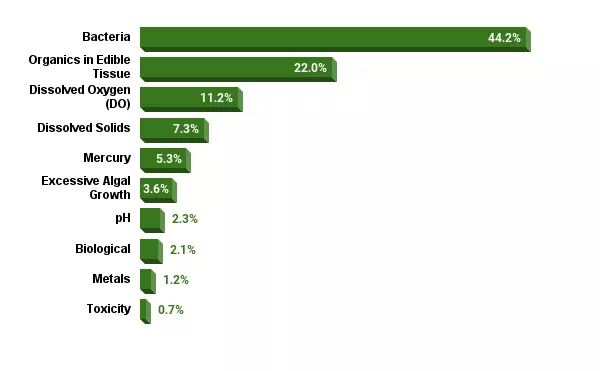Every three years, Texas Commission on Environmental Quality (TCEQ) revises the state’s surface water quality standards (“Standards”) intended to protect public health and aquatic life. These regular revisions bring in important updates about new or potential pollutants, incorporate the latest water quality data, reflect recent state and federal regulations, and address public concerns about water quality in Texas communities.
Additionally, every two years, TCEQ develops the Guidance for Assessing and Reporting Surface Water Quality in Texas (“Guidance”), a comprehensive document outlining specific procedures necessary to determine whether a water body is impaired. This document details how to measure, record, and report various water quality parameters for different types of water body uses. See the 2024 Guidance here. The Guidance ultimately helps inform the Texas Integrated Report 303(d) List which contains a list of surface waters that do not meet water quality criteria. Please note that both the 2024 Guidance and the Texas Integrated Report are considered “drafts” while waiting for approval from the Environmental Protection Agency (EPA).
Together, the Standards, Guidance, and Integrated Report represent Texas’ regulatory approach to managing surface water quality. Importantly, the Clean Water Act requires TCEQ to consult with the public during the development of each of these documents. This means that the health of our precious rivers, streams, lakes, estuaries, and coastal waters is not solely up to TCEQ and other regulatory agencies; it’s a shared concern requiring all Texans to work together.
What Do I Need to Know about Surface Water Quality in Texas?
While this is a very broad topic, here is a very concise overview of the current situation. According to the latest Integrated Report released by TCEQ earlier this year, nearly 1,400 assessed water bodies do not meet the surface water quality standards, with the majority impaired for bacteria (44%), followed by organics in edible tissue (22%) and dissolved oxygen issues (11%). Nonpoint source pollution—including agricultural and urban runoff, inadequate stormwater and sewage infrastructure, among other sources—are major contributors to these challenges.
Figure 1: Summary of the 2024 Texas Integrated Report (TCEQ 2024)

Moreover, Texas is facing serious water quality problems related to a lack of standards for salinity, especially as TCEQ continues to accept and review more permit applications for desalination plants. Additionally, pre-production plastics (“nurdles”) pollution remains a pressing concern that requires immediate attention but is currently not addressed in the surface water quality standards. Oil and gas wastewater (“produced water”) discharges from the expanding oil and gas industry in the state pose another significant risk to our rivers, streams, and lakes, and should not be permitted until more information is known about the constituents of such wastewater.
Given these developments, it is clear that more needs to be done to protect our surface waters. Fortunately, there are ways for every Texan to get involved in these important discussions and advocate for stronger protections.
How Can I Get Involved?
I’m glad you asked! There’s a perfect chance for you to participate in the upcoming public meeting of the TCEQ’s Surface Water Quality Assessment Advisory Work Group, where you can learn more about how surface water quality is evaluated in Texas and share concerns or ask questions to the TCEQ staff.
The focus of the meeting will be on developing the 2026 Guidance which will ultimately inform the 2026 Integrated Report. The meeting will be held on November 7 from 9 a.m. to 12 p.m., with both in-person and virtual attendance options available. TCEQ plans to release the registration link and meeting agenda as the date approaches. In the meantime, to stay informed and not to miss this opportunity, I strongly encourage you to sign up here to receive updates from the Surface Water Quality Assessment Advisory Work Group.
The importance of clean water cannot be overstated. Save the date to join this important conversation and help shape the future of our waters!

Photo: Colorado Bend State Park, copyright Al Braden.